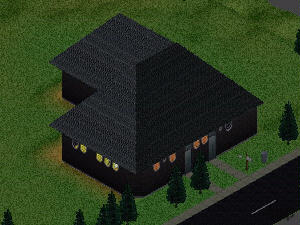Saturday 16 June 2001

|
Pic of the day: Dark times for home owners in Norway. Or perhaps not. (This picture is from The Sims.) House whinersThe general election here in Norway draws nearer. It's actually not until fall, but there's the summer holiday inbetween. So the political parties are positioning themselves as best they can. And this means vague promises to the home owners. By design or circumstance, this is a large part of the Norwegian population. And they are also surprisingly dumb, considered that most of them supposedly have a job. Or perhaps they just pretend to be dumb, so as to make politicians scratch their itch. Hard to say, but it sure looks realistic. It's the taxes. One of the things that politicians actually have some power over, at least on a national level. The counties also have the freedom to set taxes within a certain range, but they've all used the maximum taxes for so long that I doubt most people even know that anything else is possible. Anyway, the actual tax laws are enacted on a national level. And it is these that favor the home owners, and discriminate against those who rent. Not that most people seem to be aware of this. ***Let us take the most important part first. Even in Norway, most people are not born to riches. And homes are expensive, whether it is a flat in the city or a house in the suburbs. So usually people borrow most of the money it costs. Then they spend decades paying the money back, with interest. Now the tax system here is shaped in such a way that you can deduct interest expenses. (I'm not talking about interesting hobbies, much as I wish it were so, but interest on loans.) So the tax is reduced by almost a third of the interest payment. That is nice, don't you think so? Particularly as you keep in mind that there is no deduction if you rent a home. Presumably a lot of the rent goes to cover the interest expenses of the capitalist who owns your home, but no one cares. Rent is considered a private expense and those are not deductible. Except, for the most obscure of reasons, private interest expenses. The rationale for this was (if I understand this right) that interest paid by self-employed persons was considered part of their expenses before profit. To stop everyone from setting up fake microscopic companies and funnel their interest expenses through these, the government just caved in and treated all interests as equal. There is also the point, not unimportant, that income from interest is considered taxable. So to keep symmetry, interest paid is deducted. But the net effect is that home owners can deduct a considerable part of their private expenses, whereas renters cannot. The home owners whine and complain about being overtaxed. The renters don't say a word, because in Norway it is considered a great shame to not own one's own home. A person over 21 not owning his own home is considered suspect. Something must be wrong. (And usually, something is. A large number of these people are thrown out of their homes by angry spouses or similar companions. Or they could be long time students, which is not much better.) ***But the thing that really make home-owners writhe in pain is the calculated benefit from living in one's own house, popularly called "percent income". It is calculated like this: You take the tax value of the house, which is typically somewhere under half of market value. Then you deduct the value of the most rudimentary dwelling one could theoretically live in, which is supposed to be tax-free. From the rest, calculate 2.5% imaginary income, which is added to the real income for tax purposes. "How dare they tax us for an income when having a home is only expenses, expenses, expenses?" Every year some sleep is lost to this enigma. Luckily, I can explain this in two fairly simple sentences: Tenants pay the same expenses through their rent. Plus a fat profit for the landlord. If you did not understand that, I'd like to see you tie your shoelaces.
In the case of a landlord and a tenant, it is obvious that the house is
a capital investment for the landlord. The investment gives a certain
profit. For anyone to bother renting out a house, the profit should be
higher than what you get in the bank. Now I, a worker, can get 7% p.a.
in the bank without speaking with the senior staff. So obviously for
someone to rent out a home, they'd want more than that, A middle class citizen who owns his own home, is also making a capital investment. He sinks his money into the home rather than putting it in the bank. The profit he receives is that he saves on the housing cost, whereas the profit he would have received from the bank would have been a certain percentage of the saved capital. But in all these cases, the person who invests gets an economic advantage back from it. And people still have the temerity to complain that they have to pay a symbolic tax on 2.5% of a small fraction of the investment. Listen, neighbor. The people who pay your bills, don't need to hear you whine. |
Yesterday <-- This month --> Tomorrow?
One year ago
Two years ago